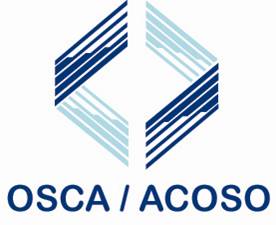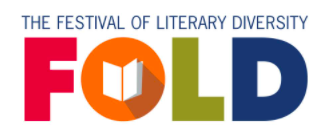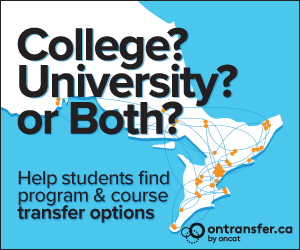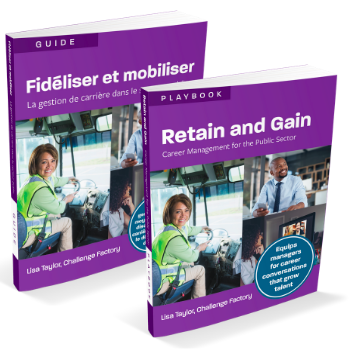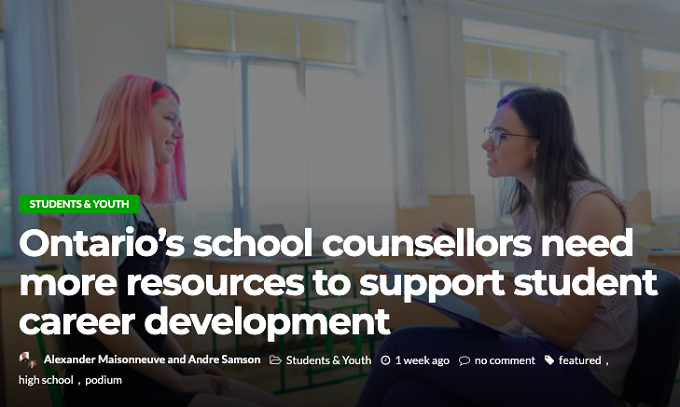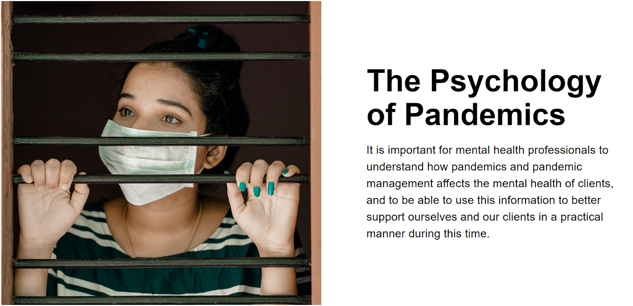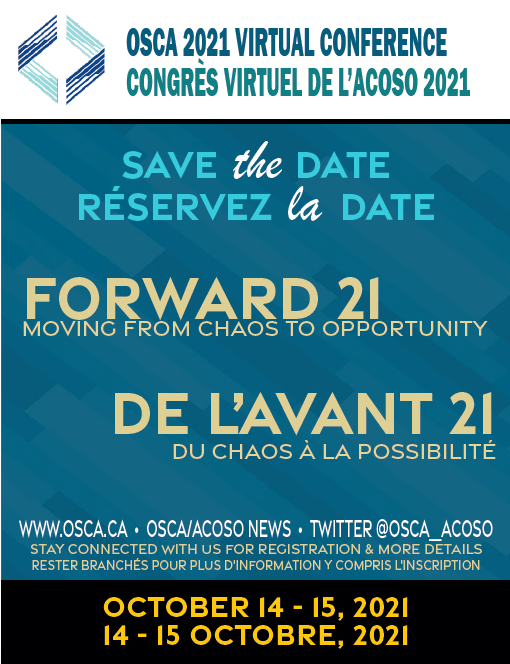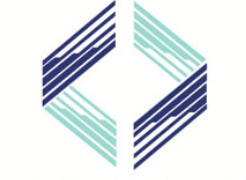 |
||||||||||||||||||||||||||||||||
| Archive | www.osca.ca | ||||||||||||||||||||||||||||||||
The deadline for nominations was May 28. Over 85 nominations were received. Thank you all for your meaningful and moving contributions. The Governance Committee is now completing their voting process and the nominees will receive an email in the coming week. Winners will be announced in next week's newsletter.
What I love most about reading nonfiction are those moments of connection. When you read about a specific experience the author has had and the feelings around that experience, and you realize oh, I’ve felt that too. It feels like getting to reach across an infinite distance and shake someone else’s hand or hug them. As a queer person, this feeling of connection through books has been particularly helpful for me while I’ve been unable to be with my community during the lockdown.
So, this month, in honour of Pride, we’re reading nonfiction by a trans or non-binary author. These authors have opened up their hearts about the things closest to them: spanning topics from parenthood to creative expression, they show us the specificity in our differences and the things that connect us as humans.
The School-College-Work Initiative has been working with the staff at OCAS on researching dual credit students transition to college. In the process, it has been noticed that there are errors appearing in student data transmissions to OCAS. Course with a "4T” or "4Y” course code are also being incorrectly flagged as being "team-taught”. Dual credit courses can be either team-taught or college delivered, but the same course can’t be delivered both ways at the same time. SCWI has created a couple of documents that may be useful to guidance staff in reviewing their reporting and recording of achievement in dual credits. There are 2 .pdf documents: "Addressing dual credit course code errors” and "Aborder les erreurs de codes de cours à double reconnaissance de crédit." There are also two PowerPoint presentations "Dual Credits: What’s in a code?” and "DRC : Tout sur les codes de cours." The files can be downloaded from the course codes section of the SCWI/IJECT web sites at http://scwi.ca/scwi/coursecodes.php or http://iject.ca/iject/coursecodes.php. As we move into the traditional season of graduations and the start of new summer jobs, it is easy to focus on all that has been lost for young people today. Coverage of COVID-19’s impact on youth employment paints a bleak picture, with references to the "Class of COVID" and characterizations of a "lost generation."
On their own, the risks of economic "scarring," disrupted academic progress and mental health crises are daunting. Add to these the lengthy time periods projected for a fulsome generational recovery, and it’s no surprise that young people feel they are facing seemingly insurmountable challenges. But this focus on despair without the presence of hope and accompanying opportunities does an enormous disservice to our youth.
Written in an innovative "travel guide" format, the Playbook is a concise, action-oriented career management resource that public sector leaders and managers can use to attract, engage and retain staff. It applies to all levels of government: municipal, provincial, federal and First Nations. The Playbook is authored by workforce expert Lisa Taylor, who integrates diversity, equity and inclusion (DEI) throughout and recognizes the unique context of public sector workplaces. The Playbook is situated in relation to the COVID-19 pandemic and its impact on public sector careers, including workforce mental health and remote work arrangements.
The rapid advance of digital technologies has significantly impacted education in recent years. It is evident that the increasing digitization of the economy and society will require students to become comfortable with technology to prepare for the future. In turn, this also requires teachers to be supported to develop the skills and knowledge required to fully utilize the capabilities of technology, whether in the classroom or in a hybridized model that utilizes distributed online learning. This is the first lesson in a series of six lessons to support the development of stress management
and healthy coping skills. This pre-recorded session is facilitated by an Ophea Educator ambassador and a clinician from School Mental Health Ontario. This session focuses on breathing strategies and how they can help us cope with stress. Guided breathing exercises are an effective and useful tool to help us check-in with ourselves and manage our emotions. These types of interventions can help decrease how our body physically reacts to stress, and helps us calm our mind. In the video, the educator and mental health professional lead a variety of breathing exercises for you and your students to participate in together.
Throughout North America, school and guidance counsellors have been essential professional resources in helping students cope with the many issues that they face. These issues often take the form of a career choice, opting for the right apprenticeship or post-secondary program, or problems related to stress and or other psychological challenges. For decades, the role of school counsellors has been filled by certified teachers. However, with the evolution of knowledge and the complexity of today’s school reality, more and more North American jurisdictions require that school counsellors hold a master’s in areas related to counselling psychology and/or school counselling.
During the COVID-19 pandemic there have been heightened levels of anxiety, depression, substance abuse, along with other psychological problems. It is important for mental health professionals to understand how pandemics and pandemic management affects the mental health of clients, and to be able to use this information to better support ourselves and our clients in a practical manner during this time.
This session will include a lecture from the speaker and will be followed by a question and answer session. Participants will have a chance to submit questions in advance of the event, as well as in the live chat. The webinar will be held on June 4, 2021, and will run from 9:00am to 12:00pm (Mountain Standard Time). This webinar will be hosted using Zoom and recorded for those who are unable to attend the live event. All registrants will receive a link to the recorded webinar and all presentation materials several days after the conclusion of the event.
OSCA/ACOSO is going virtual for 2021 and we are looking forward to connecting, learning, and sharing with you in new ways this year! With valued feedback from our members, we are excited to host a virtual conference for 2021. Join us as we move forward: FORWARD21: Moving from Chaos to Opportunity. Stay connected with us for conference registration and more details.
WE NEED YOUR HELP!This next issue of OSCA Today will drop into your mailbox one year into this global pandemic, Here is what we need:First. Resources. We would like your suggestion for support agencies that our students can Second. Articles. If you have stories, ideas or advice to help us and our students endure this Please reach out and submit your resources and articles ideas to Roderick Conte, OSCA VP of
Bonjour! Parlez-vous français? Avez-vous un baccalauréat, une maîtrise, ou un doctorat en français et vous aimez traduire de l'anglais au français?L'ACOSO a besoin de vous! _______________________________________________________________________________________
Speak French? Have a B.A., Masters or Ph.D. in French? Enjoy translating
|
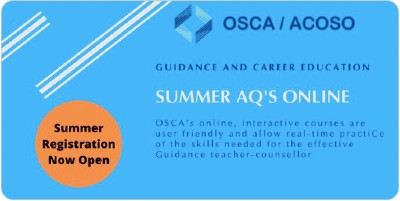 |
All three parts will be offered. Candidates may enrol in one part.
Cost: $650 (includes a copy of ethical guidelines and a one year OSCA Subscription)
Taught by a current school Guidance Counsellor, through an interactive, online classroom environment.
Candidates must hold a valid OCT and be in good standing to register.
